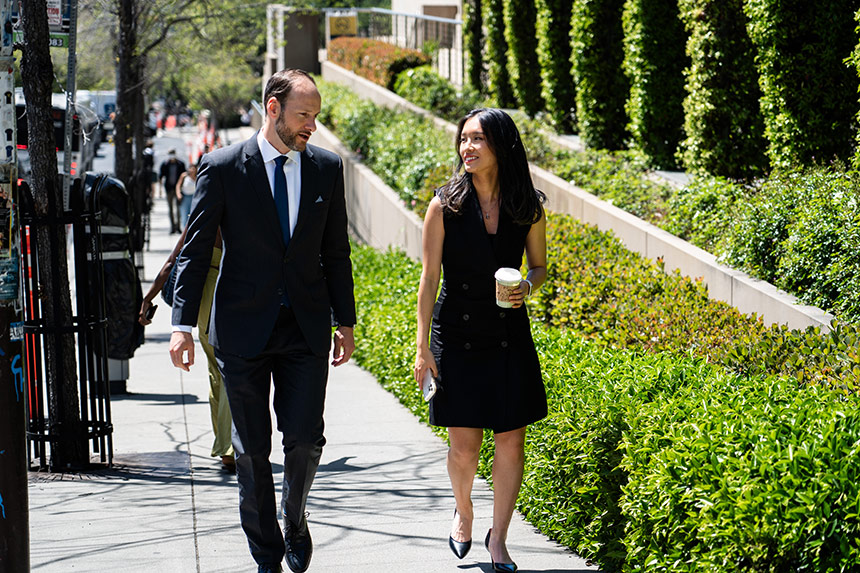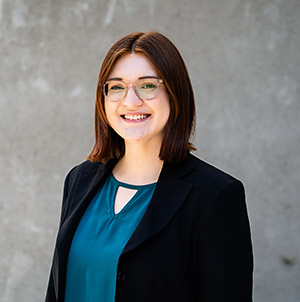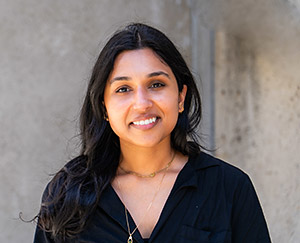
By Andrew Cohen
Berkeley Law’s surging criminal justice program got another boost with the recent launch of the Chris Larsen Justice Fellowship. Administered by the school’s Criminal Law & Justice Center, the fellowship will fund new graduates in their first year of public interest work.
“One of the challenges of making change through the law is that it’s slow, methodical work. It takes time,” says Chesa Boudin, the center’s executive director. “I’m really excited that we’re going to launch careers not just by funding their first year, but by empowering them to embark on what will be decades of public interest lawyering.”
The inaugural fellowship class — Class of 2024 members Emily Hunt, Alyssa Meurer, Sandhya Nadadur, and Chloe Pan — will begin work this fall with a sponsoring organization, write mid-year and year-end fellowship reports, and attend a conference. They will receive $49,500 for a year of work plus $5,500 for bar exam‐related costs and another $5,500 to help defray health care costs.
“I think what we all have to realize is that public safety and criminal justice reform work hand in hand — they’re really two sides of the same coin,” says Larsen, who in 2012 co-founded Ripple, a provider of enterprise blockchain and crypto solutions. “It’s super important that we make sure we get the best and the brightest into public service work.”
Inside and outside Berkeley Law, each recipient has demonstrated a strong commitment to criminal justice issues and the communities they affect.
“To me, building a better world is not just something that comes about through simply hoping for it or praying for it,” Pan says. “It is affirmatively putting in the work every single day to build the policies … and the tool kit to become the best possible advocate.”
Learn more about the new fellowship and its first recipients in this video.
Emily Hunt

Hunt will be a California Racial Justice Act attorney at the Solano County Public Defender’s Office. Passed in 2020, the law prohibits bias based on race, ethnicity, or national origin in charges, convictions, and sentences. It allows criminal defendants to challenge expressions of bias by a judge, attorney, law enforcement officer, expert witness, or juror as well as disparities embedded in the system.
“While the law is incredibly powerful, it’s under-utilized because public defender offices don’t have the resources to dedicate an attorney to Racial Justice Act litigation,” Hunt says, adding that she is “excited to work with data and statisticians to demonstrate what racial disparities exist and bring those claims on behalf of criminal defendants.”
Hunt has worked in four California county public defender offices, and dedicated over 250 hours to pro bono work while at Berkeley Law — including helping clients secure post-conviction relief through the school’s Contra Costa Reentry Project. She also participated in the East Bay Community Law Center’s Housing Law Clinic, defending tenants against evictions.
Alyssa Meurer

Meurer will work with the Uptown People’s Law Center in Chicago, helping incarcerated individuals understand their legal rights. The organization advocates for people who are in prison, experiencing homelessness, disabled, and low-income tenants while also recruiting pro bono attorneys to assist its clients.
During law school, Meurer interned with several nonprofit organizations advancing justice for directly impacted people, including Legal Services for Prisoners with Children, UnCommon Law, and the Lawyers’ Committee for Civil Rights of the San Francisco Bay Area. She also spent a year working with Berkeley Law’s Policy Advocacy Clinic to promote criminal legal reforms in Mississippi and Arkansas.
“When an incarcerated person’s conviction becomes final, they lose their right to an attorney and many end up filing their own legal documents pro se, meaning without any attorney help,” Meurer says. “With this fellowship, I’m hoping to create a resource hub for incarcerated individuals who have legal questions, as well as for prisoners’ rights attorneys across the state of Illinois to help them understand some of the procedural barriers to filing a lawsuit and how they can win relief in the courts.”
Sandhya Nadadur

Nadadur will join Dolores Street Community Services in San Francisco, serving survivors of trafficking and intimate partner violence who face deportation because of crimes they committed as a result of their traumatic experiences.
“I’ll be advocating for survivors to obtain post-conviction relief from the state criminal system to help stop their ultimate deportation,” she says. “Dolores Street is one of the few organizations that not only specializes in complicated deportation defense cases but also has already started a program in post-conviction relief. My particular project in this fellowship will utilize newly-operative language from two California statutes to expand the types of post-conviction relief they can offer.”
A supervising editor at the California Law Review and a student advocate in Berkeley Law’s Ninth Circuit Practicum, Nadadur worked at the California Immigrant Policy Center before law school and was a trial unit law clerk with the Federal Public Defender in California’s Central District.
Chloe Pan

Pan will join the District of Columbia Office of the Solicitor General, working primarily on the office’s multi-state litigation and amicus practice with a focus on burgeoning Second Amendment issues. She will write appellate briefs in circuit courts and the United States Supreme Court advocating for reasonable gun regulations that uphold public safety.
Shaped by her experiences growing up as the eldest daughter in a low-income, first-generation immigrant family, Pan has wanted to be an attorney since age 12. “Seeing so many of my loved ones struggle to access the most basic government services … made me realize that I wanted to be the advocate I wish my community had,” she says. “That’s why I’m especially grateful for this fellowship opportunity, which will let me work on a wide range of issues to do just that.”
Pan became the head of her household in 2018, when her mother was diagnosed with brain cancer, and moved her family with her to Berkeley when law school began to continue supporting them. She served as editor-in-chief of the California Law Review, won Berkeley Law’s McBaine Honors Moot Court Competition, and completed five internships while in law school, including at the U.S. Department of Justice Civil Rights Division and ACLU Human Rights Program.
Big hopes
Professor Andrea Roth, the Barry Tarlow Chair in Criminal Justice, sees the fellowship as another feather in Berkeley Law’s cap that augments a robust and versatile faculty in the field, the center’s launch last year, the heralded Berkeley Journal of Criminal Law, and numerous student-led projects.
“The Larsen Fellowship reflects a recognition of the critical need for criminal justice reform — recognized all along the political spectrum — and the challenge new graduates often have in breaking into the public interest job market,” she says. “This is an exciting addition to the center’s offerings and to Berkeley Law’s criminal law program more broadly. With our whip-smart, creative, technologically savvy, and dedicated students, the only hard part is choosing the recipients.”
Boudin, former district attorney of San Francisco, also started his career with a one-year criminal justice fellowship after law school. He foresees the inaugural class of Larsen Justice Fellows and those that follow “building a national network of lawyers committed to the public interest, justice, and safety.”